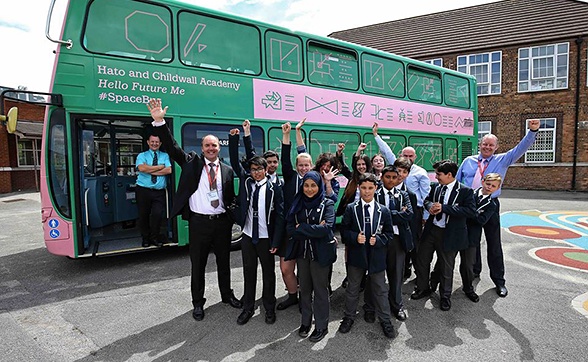How to Make a Space Bus
Posted on 25 July 2016 by Liverpool Biennial
Launching the Space Bus at Childwall Sports & Science Academy. Photo: Gareth Jones
The #SpaceBus is one of three double-decker artworks that hit the road this summer for people to ride and enjoy as part of Liverpool Biennial 2016. Titled Hello Future Me, the Arriva bus has been designed by Year 7 pupils at Childwall Sports & Science Academy, working in collaboration with designers Hato as part of the festival’s Children’s Episode. But how did the project all come together?
1. In the Classroom
Hato began by visiting the children at their school where they held a series of workshops based around the tradition of sending coded messages into outer space. Drawing inspiration from those taken on board NASA’s Voyager spacecraft in 1977, the children came up with their own alphabet of symbols, which they used to compose messages to the future citizens of Liverpool. The symbols depict things they enjoy, such as skateboarding, and who they are inspired by, including Beyonce and Ellen DeGeneres. Other represent issues they encounter in everyday life, like bullying and politics.
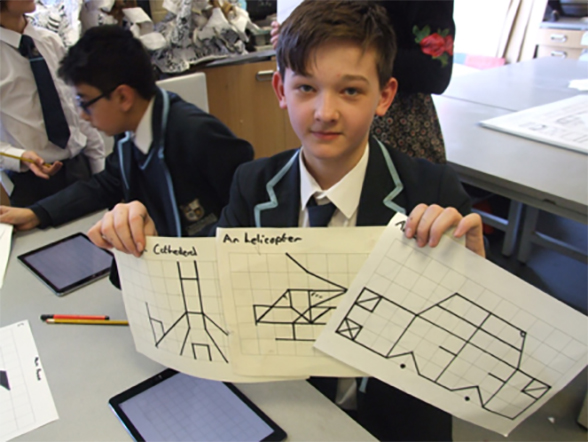
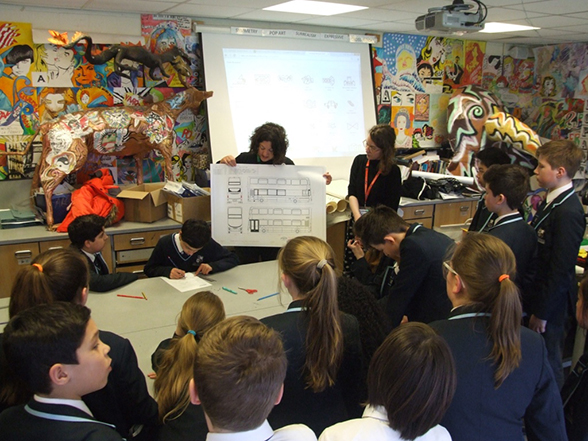
2. From Drawing Board to Bus Workshop
Taking these symbols and the children’s ideas as the basis for a design, Hato turned to the drawing board (computer screen) and began working on the blueprint for Hello Future Me, ready to send to the Arriva bus painters.
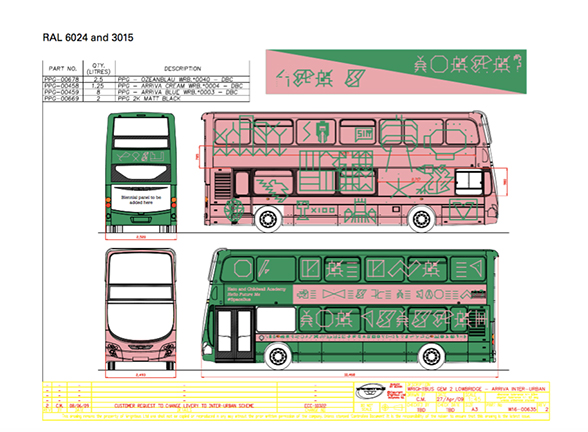

3. Meanwhile in the Depot...
In the meantime, the city bus was ready and waiting to be transformed at the St Helens Arriva bus depot. Before any of the painting could begin, the first step was to strip the bus of its previous design using abrasive paper and fit new panels. As soon as the #SpaceBus design arrived, the bus painters set to work, applying an initial gloss of pink paint followed by a second coat in green. Next, they began adding the symbols to the side of the bus by hand using a masking tape technique and graph paper plot exactly where to position each.
4. School Trip
In late May, the young artists were invited to the Arriva bus depot to check on the progress of Hello Future Me, and were delighted to see their ideas coming to life. They also learnt all about the bus painting process and even got to try their hand at the symbol painting technique themselves.
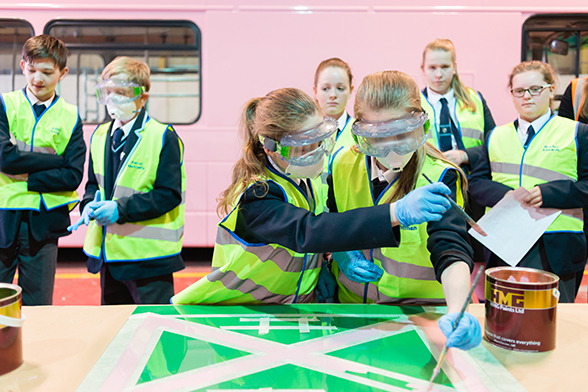
Photo: Pete Carr
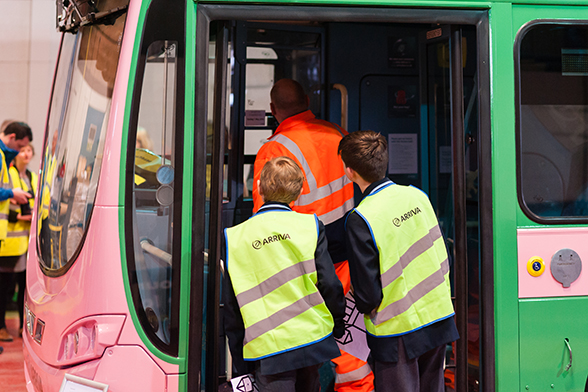
Photo: Pete Carr
5. Putting the Final Touches
Once the painting was complete, specially customised glass vinyls were added to the windows and interpretation panels fitted to the interior, completing the transformation. These panels provide passengers with instructions on how to decode the children’s symbols and read their messages. Keep an eye out for #SpaceBus on the road and see if you can work out what it says.
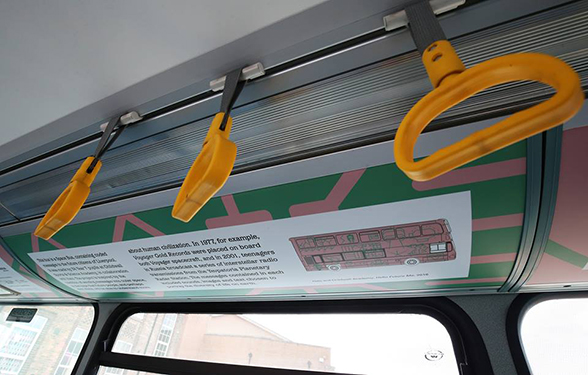
Photo: Gareth Jones
6. #SpaceBus Takes to the Road
The first stop after the completed #SpaceBus left the workshop in June was Childwall Academy. Excited to be among the first to set eyes on their creation and step on board, the children were delighted with the finished result and extremely proud to wave it off as it resumed its normal service.
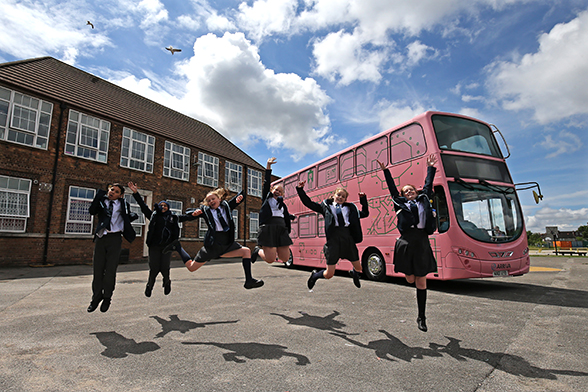
Photo: Gareth Jones
#SpaceBus is one of three Arriva buses that have been transformed into moving artworks for Liverpool Biennial 2016. The other two are Mrs. Muir (#BrickBus) by Portuguese artist Anna Jotta and Blaze (#BlazeBus) by North-West based artist Fran Disley, who is part of the Liverpool Biennial Associate Artist programme.
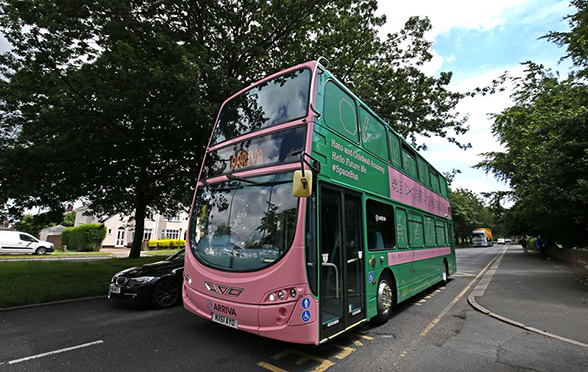
Photo: Gareth Jones
Check @arrivanorthwest on Twitter to find out the bus’ route on any given day, and tweet or instagram your photos using the #SpaceBus, #BlazeBus or #BrickBus hashtags.
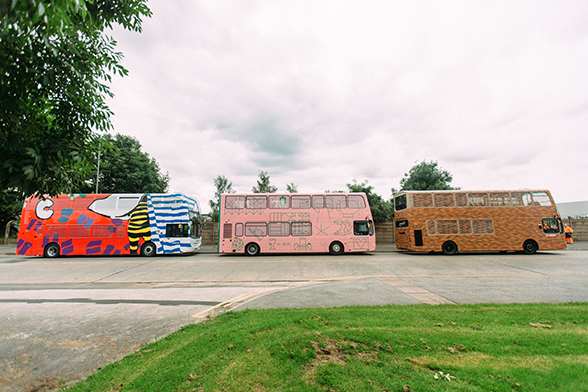
Photo: Niall Lea
Liverpool Biennial
55 New Bird Street
Liverpool L1 0BW
- T +44 (0)151 709 7444
- info@biennial.com
Liverpool Biennial is funded by
Founding Supporter
James Moores
